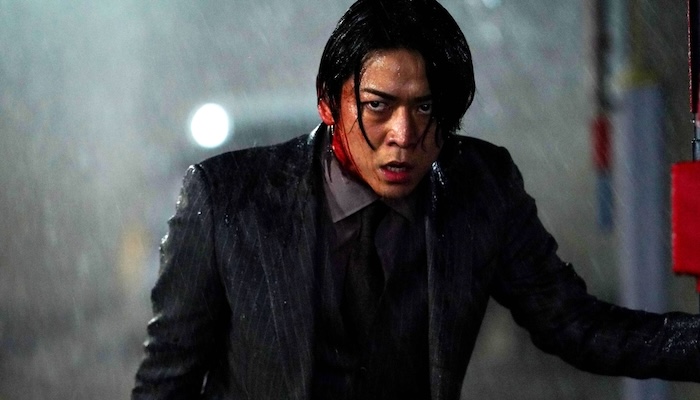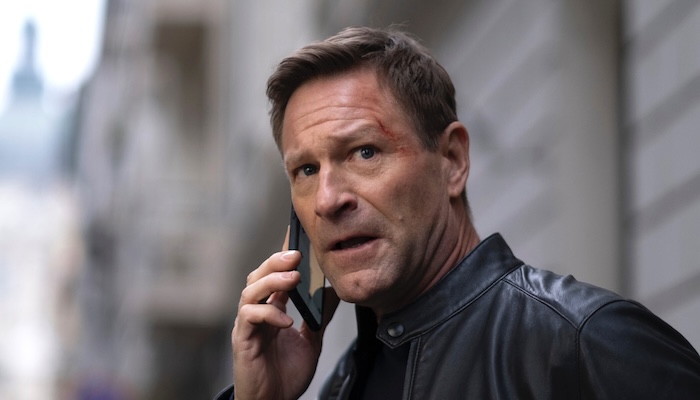Film Review: THEY WILL HAVE TO KILL US FIRST (2015): Celebrating Music In The Face Of Terror
They Will Have To Kill Us First (2015) Film Review, a movie directed by Johanna Schwartz, and starring Aliou Toure, Oumor Toure, Garba Toure, Nathanel Dembele, Khaira Arby, Fadimata ‘Disco’ Walett Oumar, and Moussa Sidi.
From the get go, They Will Have To Kill Us First keeps audiences not only informed about it’s subject matter, but engaged in it as well. After brief but informative text brings viewers up to speed on the volatile situation in Mali between the government and the nomadic Touareg people, an old TV screen flickers on and a young singer appears. He raps about the peace Malians used to know, about the insurgency waged by the MNLA rebel group, and about the weapons that poured into the West African nation after the American-backed overthrow of Libya’s Colonel Gaddafi.
He is in the middle of describing the military coup that unseated the country’s democratically-elected president and the unholy alliance made between Touareg rebels and Islamist militants in the country’s north when the transmission is abruptly cut off. We fade into an empty radio station where a voice chimes in over a speaker. The voice declares in no uncertain terms that Malians living under their rule are prohibited from broadcasting “Satan’s music” (with “Satan’s music” being defined as any music in the extremists’ book).
It is hard for Americans to imagine enduring such a scenario, but for Malians, it was their reality for months. Faced with not just the prospect of a draconian music ban but a wider implementation of theocratic laws, thousands left their homes and loved ones behind in order to flee the occupied northern half of the country. The film focuses on several of these refugees, all of whom are aspiring musicians. Khaira is a singer who traveled to Timbuktu, one of Mali’s regional capitals and a major cultural center, in pursuit of a dream to perform there before she was forced to escape when the jihadists rolled into town. Moussa, on the other hand, is an ethnic Touareg musician who kept a low profile during the occupation and only fled after the Malian army, which he says is just as bad if not worse than the Islamists, arrives on the scene.
Truth be told, the movie has no clear cut heroes who swoop in and save the day. In contrast to the brutal order imposed by the radicals, the military is portrayed as a chaotic force that operates without regard for the people it is supposed to protect and often leaves them worse off than they were before. Even the French, who ended up intervening against the terrorists marching through their former colony, are suggested to have entered the fray for less than noble reasons, presumably guilt over their participation in the aforementioned bombing of Libya that destabilized the already-fragile country. As is often the case in films about war, the only “good guys” are ordinary people like Khaira, Moussa, and fellow musician Fadimata, who get caught up in the machinations of the power-hungry and persevere in the face of incredible hardship.
Indeed, this focus on the subjects’ determination to pursue their craft in spite of the crisis engulfing them and their countrymen makes the documentary all the more powerful. Far too many films about Africa, whether documentary or otherwise, treat the continent’s inhabitants as eternal victims of eternal problems. They Will Have To Kill Us First, in contrast, neither sentimentalizes nor valorizes it’s characters, allowing their words and actions to speak for themselves and thus conferring on them a level of respect not often granted in movies like it. We may be horrified to hear Moussa admit he prefers the rule of the Islamists to the rule of the government, but we understand why he feels that way when he describes the excesses of the army, including an incident in which soldiers abducted his wife on the mere suspicion that she was a terrorist.
Even when the characters interact with Westerners, the interaction comes across as individuals of equal standing conducting business with each other instead of starry-eyed humanitarians lifting poor unfortunate souls up from their endless plight. The members of Songhoy Blues, a punk band that uses their music to convince Malians to return home and help rebuild the nation, are shown going back and forth with their French manager and jamming with such familiar faces as Nick Zinner of Yeah Yeah Yeahs fame and Brian Eno, taking time from practicing to poke fun at how the vehemently anti-modern, anti-technology extremists attacking Mali use automatic weapons manufactured within the past few decades. While they may have great calamities to overcome, Songhoy Blues also has great victories to revel in, as they do when they get to play in London before enthusiastic fans.
While the boys rock out in London, Khaira finally gets to see her dream of singing in Timbuktu fulfilled after the militants withdraw from the city. She encourages others to come out and perform too, but they fear it’s too risky to do since the terrorists’ could return. Defiant, she declares “We must return and stop being prey.” It’s a simple message of affirmation and dignity that should move even the most jaded critic, made more potent by the dire circumstances which Khaira and her countrymen had to contend with. Staying true to the spirit of it’s title, They Will Have To Kill Us First challenges those who would wage war against the human spirit, and triumphs spectacularly.
Rating: 9/10
Leave thoughts on this review below in the comments section. For more They Will Have To Kill Us First news, photos, videos, and information, visit our They Will Have To Kill Us First Page, and consider subscribing to us by Email, “following” us on Twitter, Tumblr, Google+ or “liking” us on Facebook for quick updates. They Will Have To Kill Us First is currently on limited release in New York City and set for an additional release in Los Angeles on April 1st.
Related Articles
FilmBook's Newsletter
Subscribe to FilmBook’s Daily Newsletter for the latest news!











